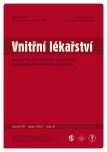Targeted therapeuticts and their role in the treatment of internal diseases
Authors:
P. Klener
Authors‘ workplace:
I. interní klinika 1. lékařské fakulty UK a VFN a ÚHKT Praha, přednosta prof. MUDr. Marek Trněný, CSc.
Published in:
Vnitř Lék 2013; 59(1): 5-12
Category:
Celebratory Discourse
Předneseno jako slavnostní přednáška na zahájení XIX. kongresu České internistické společnosti České lékařské společnosti J. E. Purkyně v Brně dne 24. října 2012.
Overview
Targeted therapy is a conceptual notion that should be used for such a treatment approach that has been developed based upon the known pathophysiology and/or biomarkers of a particular disease, mainly malignancies. Monoclonal antibodies and tyrosine--kinase inhibitors were among the first molecularly targeted agents. Monoclonal antibodies approach is based on targeting a biomarker expressed either on the surface of cancer cells or targeting different cytokines. Tyrosin-kinase inhibitors are directed at the druggable molecule involved in the cancer pathophysiology inhibiting aberrant tyrosin-kinase activity. Classification of targeted drugs and their use in the clinical practice is shortly reviewed.
Key words:
targeted therapy – monoclonal antibodies – tyrosin-kinase inhibitors – classification – clinical use
Sources
1. Airley R. Cancer chemotherapy. Willey-Blackwell, Oxford 2009.
2. Dorr RT, Von Hoff DD. Cancer chemotherapy handbook. Appleton and Lange, Norwalk, 1994.
3. Klener P. Klinická onkologie.Praha: Galén-Karolinum 2002.
4. Mladosievičová B et al. Molekulové mechanizmy patogenézy nádorov. Bratislava: SAP 2011, 123 s.
5. Estey E. New drugs in acute myeloid leukemia. Semin Oncol 2008; 35 : 439–448.
6. Mayer J, Klamová H, Žáčková D et al. Imatinib v první linii léčby s nově diagnostikovanou chronickou myeloidní leukemií v chronické fázi. Transfuze Hematol Dnes 2008; 15 : 150–158.
7. Klener P, Klener jr. P. Nová protinádorová léčiva a léčebné strategie v onkologii. Praha: Grada Publishingh 2010.
8. Moreira IS, Fernandes PA, Ramos MJ. Vascular endothelial growth fractor (VEGF) inhibition - a critical review. Anticancer agents Med Chem 2007; 7 : 223–245.
9. Hartman JT, Haap M, Koop HG et al. Tyrosine kinase inhibitors – a review on pharmacology metabolism and side effects. Curr Drug Metab 2009; 10 : 470–481.
10. Wong MK, Lo AL, Lam B et al. Erlotinib as a salvage treatment after failure of first line gefitinib in non small cell lung cancer. Cancer Chemother Pharmacol 2009; 64 : 656–663.
11. Ferrara N, Kerbel RS. Angiogenesis as a therapeutic target. Nature 2005; 438 : 967–974.
12. Chan S. Targeting the mammalian target of rapamycin (m-TOR): a new approach to treating cancer. Br J Cancer 2004; 25 : 1420–1424.
13. Klener P, Klener jr. P. ABL1, SRC a další nereceptorové proteinkinázy jako nové cíle specifické protinádorové terapie. Klin Onkol 2010; 23 : 203–209.
14. Adams GP, Weiner LM. Monoclonal antibody therapy of cancer. Nature Biotechnol 2005; 23 : 1147–1157.
15. Weiner LM, Surana R, Wang S. Monoclonal antibodies: versatile platforms for cancer immunotherapy. Natur Rev 2010; 10 : 317–327.
16. Belada D. Monoklonální protilátky v léčbě lymfomů. Remedia 2008; 6 : 416–423.
17. Tazi L, Nafil H, Mahmal L. Monoclonal antibodies in hematological malignancies: past, present and future. J Cancer Res Ther 2012; 7 : 309–407.
18. Castillo J, Winer E, Quinsberry O. Newer monoclonal antibodies for hematological malignancies. Exp Hematol 2008; 36 : 755–768.
19. Palácová M. Trastuzumab. Remedia 2009; 20 : 4–13.
20. Van Cutsem E. Cetuximab and chemotherapy as initial treatment for metastatic colorectal cancer. New Engl J Med 2009; 369 : 1408–1417.
21. Ellis LM, Hicklin DJ. VEGF-targeted therapy: mechanisms of antitumor activity. Cancer 2008; 8 : 579–591.
22. Weber J. Ipilimumab: controversies in its development, utility and autoimmune adverse events. Cancer Immunol Immunother 2009; 58 : 823–830.
23. Chan AC, Carter PJ. Therapeutic antibodies for autoimmunity and inflammation. Nature rev 2010; 10 : 301–316.
24. Choy EHS, Kingsley GH, Panayi GS. Monoclonal antibody therapy in rheumatoid arthritis. Brit J Rhematol 1998; 37 : 484–490.
25. Yuvienco C, Schwartz S. Monoclonal antibodies in rheumatic diseases. Med Health/Rhode Island 2011; 94 : 320–324.
26. Hanauer SB, Sandborn WJ, Rutgeerts P et al. Human anti-tumor necrosis factor monoclonal antibody (adalimumab) in Crohn´s disease. Gastroenteology 2006; 130 : 323–333.
27. Kelly RJ, Hill A, Arnold LM et al. Long-term treatment with eculimumab in paroxaysmal nocturnal hemoglobinuria. Blood 2011; 117 : 6786–6792.
28. Polman CH, O´Connor PW, Havrdova E et al. A randomized, placebo controlled trial of natalizumab for relapsing multiple sclerosis. N Engl J Med 2006; 354 : 899–904.
29. Carter PJ, Senter PD. Antibody-drug conjugates for cancer therapy. Cancer J 2008; 14 : 154–169.
30. Kontermann RF. Recombinant bispecific antibodies for cancer. Acta Pharmacol 2005; 26 : 1–9.
31. Goldenberg DM, Cardillo IM, Shi V et al. Bispecific anti CD20/22 antibodies inhibit B-cell lymphoma proliferation by unique mechanism of action. Blood 2008; 111 : 2211–2219.
32. Nelson AI, Reichert JM. Development trends for therapeutic antibody fragments. Nature Biotechnol 2009; 27 : 331–337.
Labels
Diabetology Endocrinology Internal medicineArticle was published in
Internal Medicine

2013 Issue 1
-
All articles in this issue
- Targeted therapeuticts and their role in the treatment of internal diseases
- Outcomes of Catheter Ablation of Atrial Fibrillation in Patients over 65 Years of Age
- Risk factors for relapsing and severe Clostridium difficile infection
- Is there dependence between the level of adipocyte fatty acid-binding protein and calcium score in asymptomatic relatives of patients with cardiovascular diseases?
- Treatment of AL amyloidosis in 2012; the benefit of new drugs (bortezomib, thalidomide, and lenalidomide). Summary of published clinical trials
- Drug induced osteoporosis
- Specificities of the diagnostics and therapy of exocrine pancreatic insufficiency
- AII antagonists in the treatment of hypertension and prevention of CVA
- Internal Medicine
- Journal archive
- Current issue
- Online only
- About the journal
Most read in this issue
- Drug induced osteoporosis
- Risk factors for relapsing and severe Clostridium difficile infection
- Specificities of the diagnostics and therapy of exocrine pancreatic insufficiency
- Outcomes of Catheter Ablation of Atrial Fibrillation in Patients over 65 Years of Age
